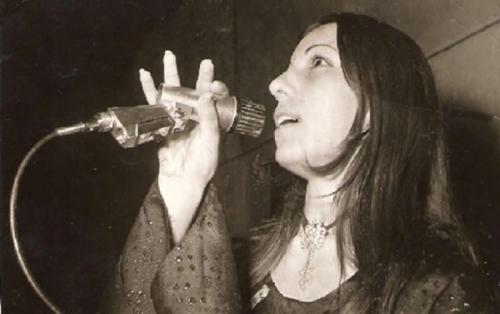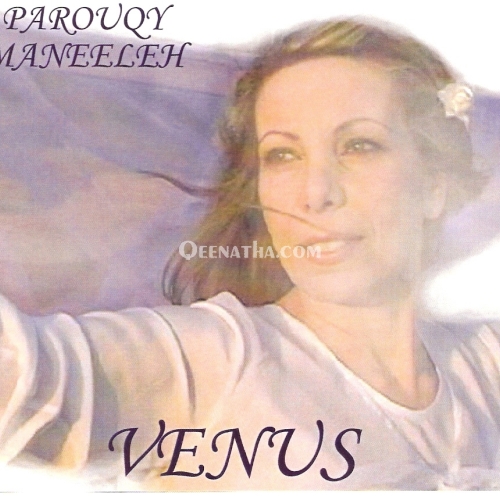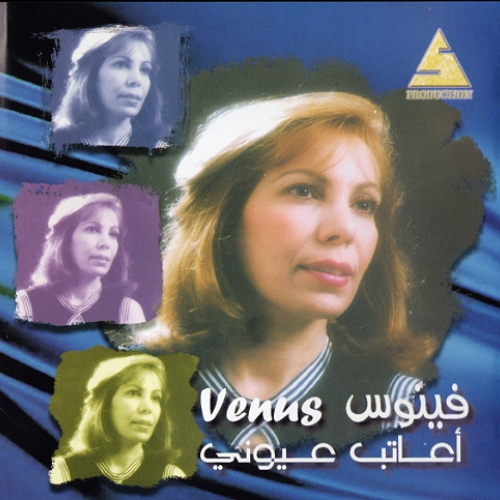Venus
Details
- Artist Type
- Singer
- Biography
-
VENUS al IRAQ
Born Agnes Youkhana, Venus was born in Basra, educated in Fao and Baghdad. She began singing while in grammar school during school functions. Turning her singing act into a professional career in 1973, she chose the name Venus. The name, much to her liking, is of the Island of Venus – Cyprus, once conquered by the Assyrian Empire in 709 B.C.
Venus has enjoyed the onset of her career at the height of Iraq’s modern musical and theatrical glamour – stardom at the renowned Baghdad Culture Clubs - Nadi Al Thaqafi, Nadi Al Athouri, Nadi Babel Al Chaldani. A rarity among her peers, achieved only by a few select Assyrian artists, Venus has attained Bi-Cultural fame, crossing into mainstream art, becoming nationally known in her native Iraq, where she has been bestowed with an Honorary Award from The Iraqi Union of Artists.
Did you know? That Venus was the voice behind the radio personality and TV Kirkuk – aired from Baghdad in 1973? She was also very athletic in Volleyball and Track & Field. In fact, she considers the Assyrian woman in Iraq to be much more active than in the United States, adds Venus "the Assyrian woman in the States is preoccupied with the office and home. But that is all! This, to me, is no more than an excuse. If a woman wants to achieve something, she can do it."
On Iraq - "No one can feel for the Iraqis what they have endured," shares Venus, who has sold her own stage wardrobe and house furniture to feed her children." "But the Iraqis are strong-willed, and they have high moral expectations, and so we survived, not one, but two wars." Turning corners, "among many other families we took refuge into neighboring Jordan," where Venus began a second chapter in her singing career, enjoying many concerts (umsiyat) during the latter years in Jordan.
On goals – Venus does not calculate time with age. Personally, she feels that she has not had the break she’s longed for, that at the appropriate time the right opportunity will present itself and she will grab it. In the meantime, she wants to work on projects that are in line with modern Assyrian timeline. In fact, she looks for distinguished projects; even in lyrics for her songs she prefers material that is particular with current circumstances. Venus’ recent projects have been the release of her two CD’s ~ one in Assyrian "Parouqy Maneeleh" and the second Iraqi Folklore. Additionally, she took center stage at the production of "A Bride from Baghdad," (currently on DVD and VHS) a sold out show in Michigan and San Diego. Venus graced the stage with her acting abilities, mesmerizing her audience, some who were fans from Iraq’s 70’s, and others, the younger generation, who opened up to her Iraqi dialect, and were very receptive of her as an Iraqi woman having achieved great strides in stardom.
Throughout her singing and acting career, Venus feels that she is still sailing smoothly. She has lived for art, not used art as a means to live. She is true to her colors, and in the Chicago community, she has been very active, oftentimes spotted in rallies and demonstrations. In her last album, Venus wanted to express to her audience the effects of the orchestrated mistreatment of Assyrians in Iraq during the 2004 Iraqi National Elections, depriving thousands from receiving ballots, and from exercising their constitutional rights to vote, a first in Iraq’s history. Like a trooper, Venus set the motion in gear and recorded "Basoree Bemenyana " singing about the injustice that was served during the elections, recorded in bi-lingual Assyrian and Arabic.
On Lyrics - Venus prefers women writers because only a woman can reach the depth of another woman’s heart. A male lyricist oftentimes describes the human feelings in lyrics from a man’s perspective while a woman sings his songs.
On Stardom - In her community, Venus has remained faithful, delivering a message to her all-around torn nation these days. Oftentimes as an artist she has suffered the backlash of losing fame at a cost?! But to this artist, success that comes in fast lanes and signed contracts is worth risking for one’s national honor. Rarely have artists taken such long and narrow paths, sacrificing monetary glory. This, without a question, places Venus in the stature of other international female artists who are famous for being proactive and outspoken during times of war and have been directly responsible for uniting the people ~ Fairouz and Majida El Roumy are two such artists who have delivered the message, greater than just a song, an awakening to one’s national cause.
Among her prized accomplishments are her two sons – Ronnie and Rami. The younger, Rami, is a well-known violinist to the Chicago-Assyrians and surrounding communities. "But parenting, Venus shares did not come overnight, and by no stretch of the imagination was it easy, especially after the war tore Iraq – its economy, communities and the luxurious lifestyles that its people were accustomed to."
During the interview, Venus often spoke about her relationship with her father Mr. Youkahna, whom she considers to be the most complete man in her life, one who’s had a primal affect on her life choices of integrity, teaching her valuable lessons about maintaining vigil in times of hardship and remaining true to her Classical style.Courtesy Innana Magazine
By Helen Talia
VENUS al IRAQ
Born Agnes Youkhana, Venus was born in Basra, educated in Fao and Baghdad. She began singing while in grammar school during school functions. Turning her singing act into a professional career in 1973, she chose the name Venus. The name, much to her liking, is of the Island of Venus – Cyprus, once conquered by the Assyrian Empire in 709 B.C.
Venus has enjoyed the onset of her career at the height of Iraq’s modern musical and theatrical glamour – stardom at the renowned Baghdad Culture Clubs - Nadi Al Thaqafi, Nadi Al Athouri, Nadi Babel Al Chaldani. A rarity among her peers, achieved only by a few select Assyrian artists, Venus has attained Bi-Cultural fame, crossing into mainstream art, becoming nationally known in her native Iraq, where she has been bestowed with an Honorary Award from The Iraqi Union of Artists.
Did you know? That Venus was the voice behind the radio personality and TV Kirkuk – aired from Baghdad in 1973? She was also very athletic in Volleyball and Track & Field. In fact, she considers the Assyrian woman in Iraq to be much more active than in the United States, adds Venus "the Assyrian woman in the States is preoccupied with the office and home. But that is all! This, to me, is no more than an excuse. If a woman wants to achieve something, she can do it."
On Iraq - "No one can feel for the Iraqis what they have endured," shares Venus, who has sold her own stage wardrobe and house furniture to feed her children." "But the Iraqis are strong-willed, and they have high moral expectations, and so we survived, not one, but two wars." Turning corners, "among many other families we took refuge into neighboring Jordan," where Venus began a second chapter in her singing career, enjoying many concerts (umsiyat) during the latter years in Jordan.
On goals – Venus does not calculate time with age. Personally, she feels that she has not had the break she’s longed for, that at the appropriate time the right opportunity will present itself and she will grab it. In the meantime, she wants to work on projects that are in line with modern Assyrian timeline. In fact, she looks for distinguished projects; even in lyrics for her songs she prefers material that is particular with current circumstances. Venus’ recent projects have been the release of her two CD’s ~ one in Assyrian "Parouqy Maneeleh" and the second Iraqi Folklore. Additionally, she took center stage at the production of "A Bride from Baghdad," (currently on DVD and VHS) a sold out show in Michigan and San Diego. Venus graced the stage with her acting abilities, mesmerizing her audience, some who were fans from Iraq’s 70’s, and others, the younger generation, who opened up to her Iraqi dialect, and were very receptive of her as an Iraqi woman having achieved great strides in stardom.
Throughout her singing and acting career, Venus feels that she is still sailing smoothly. She has lived for art, not used art as a means to live. She is true to her colors, and in the Chicago community, she has been very active, oftentimes spotted in rallies and demonstrations. In her last album, Venus wanted to express to her audience the effects of the orchestrated mistreatment of Assyrians in Iraq during the 2004 Iraqi National Elections, depriving thousands from receiving ballots, and from exercising their constitutional rights to vote, a first in Iraq’s history. Like a trooper, Venus set the motion in gear and recorded "Basoree Bemenyana " singing about the injustice that was served during the elections, recorded in bi-lingual Assyrian and Arabic.
On Lyrics - Venus prefers women writers because only a woman can reach the depth of another woman’s heart. A male lyricist oftentimes describes the human feelings in lyrics from a man’s perspective while a woman sings his songs.
On Stardom - In her community, Venus has remained faithful, delivering a message to her all-around torn nation these days. Oftentimes as an artist she has suffered the backlash of losing fame at a cost?! But to this artist, success that comes in fast lanes and signed contracts is worth risking for one’s national honor. Rarely have artists taken such long and narrow paths, sacrificing monetary glory. This, without a question, places Venus in the stature of other international female artists who are famous for being proactive and outspoken during times of war and have been directly responsible for uniting the people ~ Fairouz and Majida El Roumy are two such artists who have delivered the message, greater than just a song, an awakening to one’s national cause.
Among her prized accomplishments are her two sons – Ronnie and Rami. The younger, Rami, is a well-known violinist to the Chicago-Assyrians and surrounding communities. "But parenting, Venus shares did not come overnight, and by no stretch of the imagination was it easy, especially after the war tore Iraq – its economy, communities and the luxurious lifestyles that its people were accustomed to."
During the interview, Venus often spoke about her relationship with her father Mr. Youkahna, whom she considers to be the most complete man in her life, one who’s had a primal affect on her life choices of integrity, teaching her valuable lessons about maintaining vigil in times of hardship and remaining true to her Classical style.
Courtesy Innana Magazine
By Helen Talia



